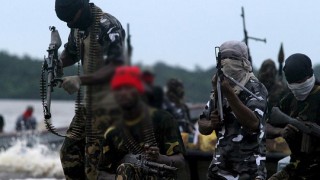Niger Delta Avengers. With a name that sounds like Nigeria’s version of Marvel’s popular superheroes, one could think they were and, honestly, you can be forgiven for thinking so. Well, maybe not. Late in the evening yesterday, the militant group released a statement regarding what it wanted. “…We want our resources back to restore the essence of human life in our region for generations to come because Nigeria has failed to do that. The world should not wait until we go the Sudan ways,” the statement read. The Niger Delta Avengers appear to be serious about their demands, which range from receiving a greater share of the oil revenue, to continued amnesty payments, to the Niger Delta cleanup and now to secession, and they could end up receiving their demands. Here are the reasons why:
This is to show the whole world that Nigeria Military is good in harassing innocent Civilians.
— Niger Delta Avengers (@NDAvengers) June 1, 2016
They have support and are organised
The Niger Delta Avengers have a twitter account with over twenty five thousand followers, even more than some Nigerian government agencies online. Though at its core, the group itself is made up “of maybe 100-150 persons” according to Dirk Steffen, an analyst with Denmark-based Risk Intelligence, it looks like by the end of this hullabaloo, they can have an army. Their rhetoric of avenging the Niger Delta and fighting for its interests has garnered them avid followers and supporters from the south-south region of Nigeria. They have also demanded for the release of jailed Biafra leader, Nnamdi Kanu, meaning they are sure to gain help from Biafra sympathisers as well. Their tactics appear to be fashioned towards validating their existence and justifying their activism and it seems to be working. Several years of short-term solutions for the problems plaguing the Niger Delta region has created this monster threatening to destroy Nigerian unity and now, the country is facing a threat to its sovereignty like never before. “The NDA (Niger Delta Avengers) are most likely a ‘mouthpiece’ for a yet unorganised number of armed groups in the Niger Delta, but that makes them no less of a concern. Like the Movement of the Emancipation of the Niger Delta (MEND) they may quickly turn into a rally point in case of an exaggerated military backlash,” Dirk Steffen said in an article in April. His prophecy seems to have come to pass but that seems to be the least of Nigeria’s problems.
The Nigerian Army seems toothless
Nigeria’s leading weapon of intimidation, its military, has always helped out when other solutions failed. This time it seems their brute strength will not be enough. A tweet by the NDA about the Nigerian army, last week, and the reaction it generated seems to sum up widespread opinions about the Nigerian army in the south. Years of military “interventions” in that part of Nigeria has fuelled the disillusion concerning the army and it doesn’t look like they will be able to quench this fire. This week, Nigeria’s State Petroleum Minister, Ibe Kachikwu, announced that the country will “descale the intensity of military intervention in the area within a week or two so that dialogue can take place,” after it emerged that the government was looking to start negotiations with the militant group. However, that looked like they were beating a hasty retreat rather than some pre-dialogue tactics.
Their threats are real
It all started with threatening to blow up oil pipelines, then actually doing it. Shell Petroleum Development Company, Chevron, and Forcados have all had some of their oil facilities blown up by the NDA. Some of these pipelines were further inland, inside the Niger Delta’s hard-to-navigate swampy forests, meaning these militants knew exactly what they were doing. There was a reported case where the group used divers to attack an underwater Shell pipeline. If that that does not typify their singularity of purpose, then one wonders what does. Their actions have set Nigeria back further in terms of oil production and now the country is facing a 20-year shortage in that aspect. This has implications for its oil revenue and its GDP status and recession seems like a real threat now, not some distant possibility.
Political undertones
Many Nigerians have termed this a matter of “Corruption fighting back.” Nigeria’s south-south region is a stronghold for members of the opposition, the People’s Democratic Party (PDP), who feel that the president’s war on corruption was targeted only at members of their political party. This is quite debatable since the only known conviction on the war on corruption is a member of Buhari’s party, the All Progressives Congress (APC). Earlier this week, there were rumours that during a meeting with Vice President Yemi Osinbajo, six governors of states in the Niger Delta region, asked the federal government to drop corruption charges levied against former militant leaders and those involved in the campaign funds scam meant for fighting Boko Haram. This inadvertently means that these governors know (or are actually) the perpetrators behind these attacks. If this ‘manufactured’ assertion is true, then Nigeria will probably not see the end of this debacle soon. Cornered rats are usually the most dangerous. Nigeria’s bid to secure peace might see it withdrawing charges of corruption in the coming weeks.
The Niger Delta Avengers seem to know their political science too, going by their comments about Sudan and South Sudan’s secession. Hence, Nigeria finds itself in a conundrum. Should it give in to their demands and continue to encourage this militancy culture and the continuous demand for secession, or enforce its sovereignty with the power of the military and further alienate the people of the Niger Delta?








